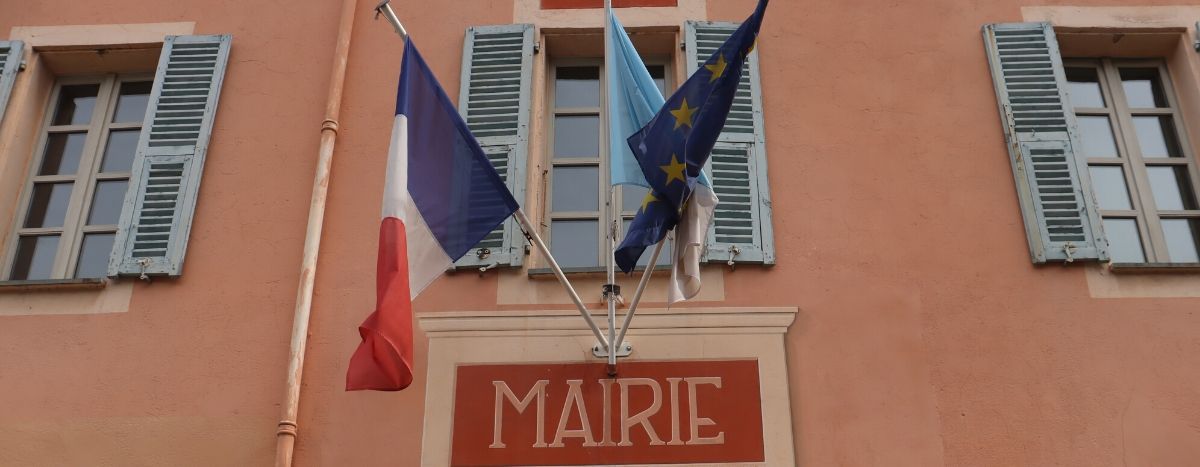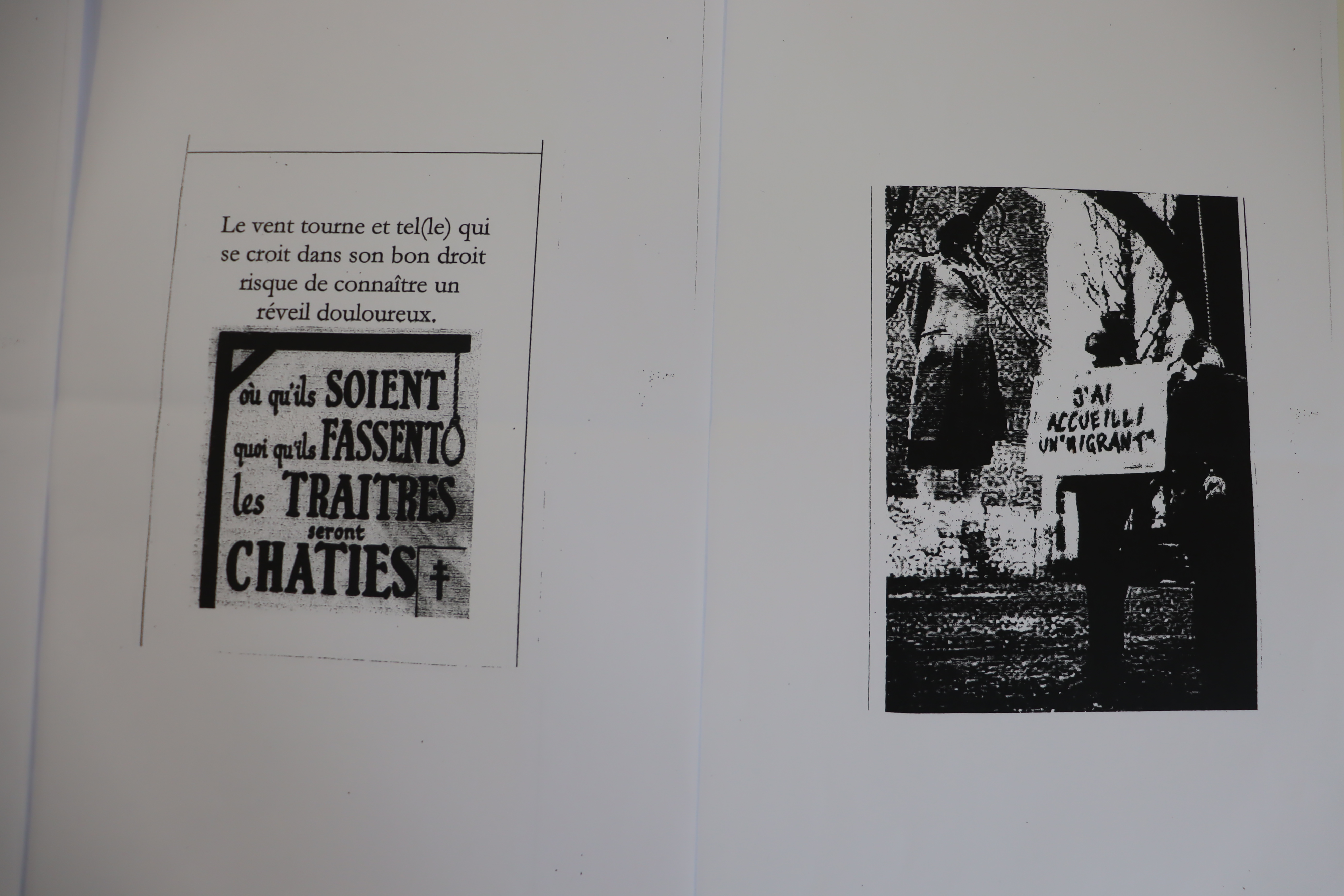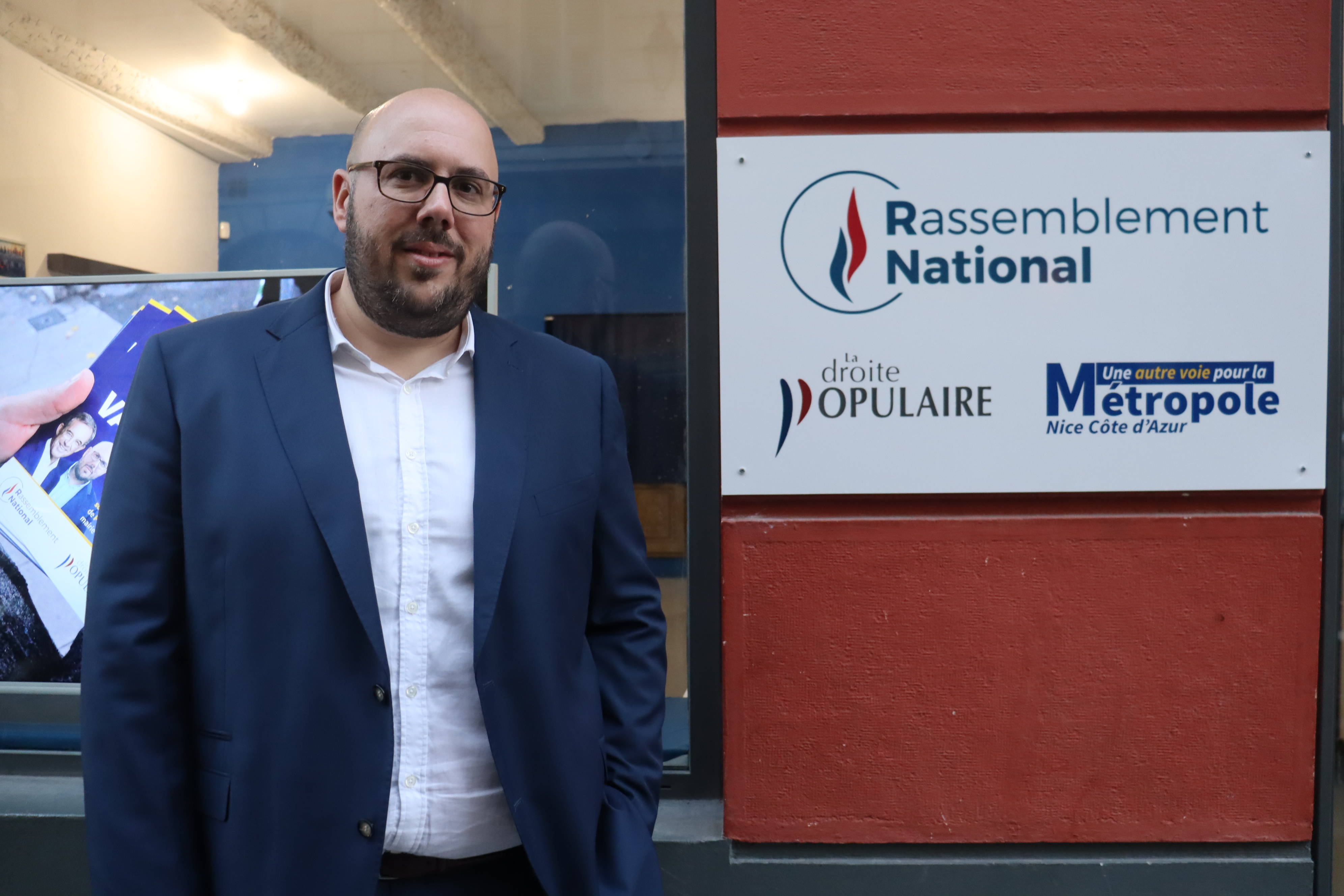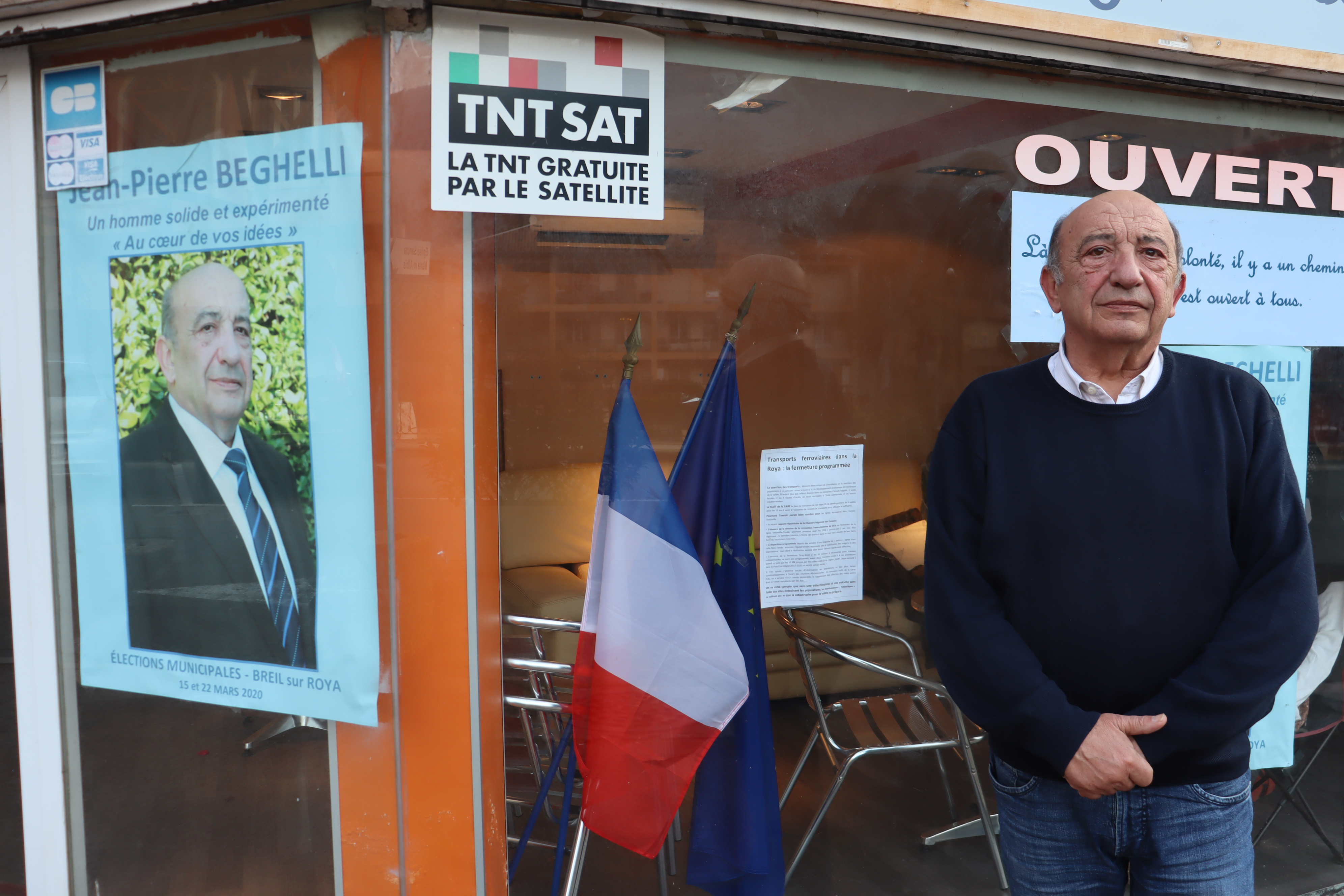
How far-right movements are influencing municipal authorities in the Alpes-Maritimes
Published on
Translation by:
Carmen Oñate FontFrom attacks against asylum seekers and civil society actors to displaying intimidating slogans and flags around the frontier with Italy, the identitarian right is attempting to gain power in the French region of Alpes-Maritimes by exploiting fears around migration. This is the first instalment of 'Extreme Border,' a three-part investigation into how such networks are jostling to gain political influence.
"Negroes Out! We're going to beat you, smash your faces in, rip you to pieces!" It's the 13 April 2019 and the scene is Contes, on the outskirts of Nice. The usually peaceful Paillon valley is alight with tension. About fifteen young people are congregated around the parking lot of an apartment building, shouting Nazi slogans. Many of them sport shaved heads, bare torsos and tattoos. Some are armed with knives and other bladed weapons. Their target is Hugo, one of the residents of the hamlet. The group launches a projectile which shatters one of the apartment windows and injures the 58 year old man. "The glass exploded and I felt something cut my face," Hugo testifies after being transported to hospital, practically unconscious and strapped to a stretcher. In an episode lasting barely fifteen minutes, his car was destroyed, along with all of the windows in his home.
Hugo wasn't the only person to be targeted that night. Roya Citoyenne, an organisation that helps organise refugee reception, accommodated four other asylum seekers that same evening. According to a statement put out by the organisation, the victims were "severely psychologically traumatised" by the attack. "Today Hugo doesn't want to go home. We find hosts for him wherever we can," says Patricia Alunno, a former board member of the organisation, and one of the man's friends.
In the meantime, only two of the attackers are facing legal prosecution. "We know, however, that the assailants are part of the local delegation of Bloc Identitaire (The Identitarian bloc)" insists Hugo's lawyer, Zia Oloumi. As Oloumi talks about the small far-right band he mentions that one of their leaders, Sébastien Toesca, is among those "that gravitates around Philippe Vardon."
Vardon is the co-founder of the Bloc Identitaire and now head of the list of the Rassemblement National (National Rally), the party which is the successor to Marine Le Pen's National Front, and which is running in the municipal elections in Nice. The RN candidate, who was formerly the singer of fascist-punk group Fraction Héxagone didn't hesitate in supporting Hugo's attackers, describing their trial as "an intense propaganda exercise." The prosecution in Nice, meanwhile, maintains the attack emerged from the activities of an explicitly "racist" network.
Death threats
Discrediting those who come to the aid of migrants is a common tactic among far-right groups. But some go even further. In July 2017 Mireille Damiano, a lawyer who collaborates with Roya Citoyenne, received death threats by post.

The above letter contains a photomontage made from an edited black-and-white archival image of hanged women. One of them has a sign around her neck, bearing the inscription: "I welcomed a migrant." Another reads: "The tide is turning, and those who think they are in their right may experience a painful awakening." In light of this intimidation, the staff at Roya Citoyenne decided to file a complaint in order to protect Damiano and her family. "My children were worried about me," she says, "they came to pick me up from work in the evening, it was a bit complicated. There are a bunch of violent identitarian groups here in Nice."
An indelible past
A new campaign office has just been inaugurated in the countryside, a stone's throw from the port of Nice. The walls are colourful and the paint still smells fresh. There's a sign on the wall, engraved with a blue, white and red flame and the initials RN: Rassemblement National.
Inside, two men are chatting animatedly. One of them is Philippe Vardon. He's dressed in rectangular glasses, with a white shirt and navy blue jacket. This is a new, more chic and relaxed look for the RN candidate. His appearance is certainly radically different to a few years ago. Before this recent turn of events, the Fraction Héxagone singer was, in fact, the former leader of the identitarian political movement Nissa Rebela (Rebels of Nice). In 2013, he was even refused membership to the Front National on the basis that he was too fanatical. Seven years later, Vardon's ideas haven't changed, but the audience for his speeches has increased tenfold. He's worked his way up, first becoming a member of the "ideas and image" committee of Marine Le Pen's presidential campaign. Next he was Vice-President of the RN group at the regional council of Provence-Alpes-Côte d'Azur (PACA / Région Sud). Now, in the 2020 municipal elections, he hopes to win the town hall of Nice.

What's taking place, essentially, is a merging of the extreme right elements within the RN. In 2017, when the party was still known as the Front National, Gaël Nofri described this as a "the mainstreaming of the identitarian movement." Nofri was a former campaign director for Jean-Marie Le Pen in the region of Paca and has since joined the centrist candidate Christian Estrosi's faction, denouncing the integration of identitarians. This is not a perspective that Philippe Vardon shares. On the contrary, in these elections he has actively incorporated militants from Nissa Rebela including Odile Tixier Gubernati and Aulde Maisonneuve into his list. In Vardon's own words, these are two "historical figures in the identitarian movement."
Migration, a major campaigning tool
"When I see the migrant camps in the city centre and the scum that hang out on Jean Médecin avenue, dotted with kebab shops, I no longer recognise Nice." This is a quote from one of Vardon's speeches last June. Yet it was earlier still, back in 2015, when hundreds of refugees arrived at the Franco-Italian border, and specifically in the Roya valley, that the divisions between 'pro' and 'anti' migrant groups emerged in their current form. For the media, one side of this equation, the liberal-progressive side, is embodied by the figure of Cédric Herrou, a farmer who has been providing aid to migrants that make the crossing. On the other side are the residents of the town of Breil-sur-Roya, where Marine Le Pen won 29.54% in the first round of the last presidential elections, followed closely by Jean-Luc Mélenchon, on 26.57%. Emmanuel Macron gained just 15.60% of votes.
There is, in other words, an opportunity for the far-right to gain here: to instrumentalise the issue of migration by supporting opponents of the phenomenon, whether illegal or otherwise. In 2017, Olivier Bettati, former deputy to Christian Estrosi at the town hall of Nice, and now head of the RN list in nearby Menton, went to court to request the dissolution of Roya Citoyenne. This initiative was organised in coordination with a far-right movement, Défendre la Roya ('Defend La Roya'), which he's often promoted. According to Bettati's political opponents, this move was a kind of warm up exercise for the municipal elections. Mireille Damiano, for example, claims the movement was "explicitly created in order to eliminate Roya Citoyenne" and that she personally saw representatives from identitarian movements in the square on the day of the hearing. In any event, Bettati lost the case and Défendre la Roya has been dormant ever since.
Dangerous Links
Located 60km from Nice, the municipality of Breil-sur-Roya is the largest in the Roya valley. Here Jean-Pierre Béghelli, a political activist well-known to the local population for opposing Cédric Herrou's actions, is presenting an independent electoral list. A self-described "right-wing guy", he decided to put himself forward without affiliation, despite the RN's "proposal of support." This was a strategic choice given the left-wing sensitivity of some of the inhabitants of Breil, and the affiliation of the outgoing mayor. But while the city councillor claims he has no political 'colour', his associates incline heavily towards the RN and groups even further to the right. In fact, he has been personally linked to Défendre la Roya.

On 6 October 2017 Défendre la Roya organised a meeting in Breil to announce that it had initiated a legal process to request the dissolution of Roya Citoyenne. "While there may have been people from my list there, I did not personally attend," declared Jean-Pierre Béghelli resolutely, presumably unaware that the meeting was being livestreamed and that he is clearly visible in the foreground.
Also present was Rodolphe Crevelle, a fascist activist who has been imprisoned several times for "incitement to racial hatred", and who has been distributing his "anti-migrant" newspaper A Vugi d 'a la Roya ('The Voice of La Roya'), with a circulation of 5,000, throughout the valley for some time. While Défendre la Roya denies any connection with A Vugi, there are some indications to the contrary. On 15 October 2017, for example, Crevelle organised a meeting to support his newspaper in the small neighbouring town of Fontan. Despite claims to the contrary by Défendre la Roya's President, members of the association were in attendance.
"That was some nasty shit in Vugi"
"It was a demonstration in support of the newspaper. Béghelli was there and so was Fernand (Vice-President of Défendre la Roya). He personally distributed A Vugi ..." This is the testimony of Pascal, a merchant from the valley who was present at the meeting (and who requested that his name be changed here). The event, he says, brought together people from "all over France", including "the mayor of Fontan, Philippe Oudot, and extreme right-wing groups such as Action Française and the Alliance Royale (neo-monarchist movements) and members of the Lys Noir (a far-right literary-political organisation)."
Shortly before the demonstration A Vugi had called for a "valley reconciliation committee" to be set up "under the chairmanship of Jean-Pierre Béghelli." Défendre la Roya co-organised this forum. Taking this fact into account, it becomes immediately difficult to dispute the link between the independent candidate, Jean-Pierre Béghelli, the anti-migrant association Défendre la Roya, and the openly racist newspaper A Vugi.
Nevertheless, when asked about his affiliation with A Vugi, Jean-Pierre Béghelli denies everything. "I never had a relationship with these people. That was some nasty shit in Vugi... they wrote about people without even asking them questions". Later, however, he moderates his remarks and admits to going to the meeting "just to see what was going on." It's worth remembering here that of all the towns in the valley, the municipality of Breil distinguished itself in 2017 by purchasing train tickets for 80 asylum seekers, thereby allowing them to travel freely. This decision was subsequently contested by two “hard right” candidates that came forward to oppose the outgoing mayor.
With the elections around the corner, one has to wonder what will happen if the valley does indeed turn to the navy blue of the RN. "Are the territories that are most involved in welcoming migrants going to pay the price for their actions at the ballot box? I don't think there can be a boomerang reaction," says Mireille Damiano, who is also running in Nice as part of the left-wing list, Viva. "Roya Citoyenne has been accused of 'distorting' the image of the valley", she says, "but we must not forget that the political sociology of the valley is heavily polarised both with and against the far-right."
The first round of the French local elections took place on 15 March 2020. In Nice, the incumbent mayor Christian Estrosi (LR, Les Républicains) won 47% of the vote. Philippe Vardon, the RN candidate, came in second with 16%. The next ballot has been rescheduled due to the ongoing COVID-19 emergency.
This article is the first in the three-part series 'Extreme Border' by the journalist Safouane Abdessalem. By investigating the frontier between France and Italy, Abdessalem attempts to uncover the electoral strategies of the far-right in the 2020 municipal elections. How far is the extreme right ready to go to seduce voters? Find out more in the next instalments.
This project was carried out in collaboration with the Ecole des Hautes Etudes en Sciences Sociales, coordinated by the OpenEdition Center, financed by the Support Fund for Emergence and innovation in the press of the Ministry of Culture.
Cover photo: Breil-sur-Roya town hall © Safouane Abdessalem
Translated from Comment les identitaires planent sur les municipales dans les Alpes-Maritimes



